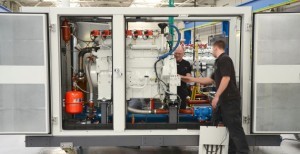
Background
ENER-G is a company who designs, develops and finances energy-efficient, sustainable and renewable solutions on a business-to-business basis globally. Components, primarily engines, are purchased from automotive suppliers to support the business. The engines are used at the heart of ENER-G’s efficient Combined Heat and Power systems which allow businesses to save money on their energy bills whilst also reducing their carbon footprint. Established in the 1980s, ENER-G has since grown through acquisitions and organically to a current turnover of £130 million. ENER-G employs more than 750 people around the world and has a presence in 17 countries. It operates more than 365MW of generation capacity, which enables its customers to reduce their collective CO2 emissions by 5 million tonnes per year, equating to the environmental benefit of taking 1.7 million cars off the road per year.
The Challenge
ENER-G had identified a need to improve the cost base and delivery of its products. This was due to increased pressure from the marketplace.
The Objectives
The project aim was to improve the company’s competitiveness and the ability to respond quickly to its market conditions.
The Industry Forum Solution
With funding assistance from the Northwest Automotive Alliance (NAA) Business Excellence (BE) programme and advice and mentoring from the team at Industry Forum in quality, cost and delivery (QCD) both internally and through ENER-G’s supply chain, the following initiatives were undertaken in the CHP business based in the North West:
A manufacturing improvement programme including a manufacturing diagnostic looking at QCD data, material flow, value-add/non-value-add analysis with improvement workshops.
A business improvement project for the company’s sales order and planning process, consisting of a value stream mapping exercise together with capacity analysis, development and implementation of a new framework.
The Industry Forum ‘learn by doing’ approach encouraged staff on the front line to identify and carry out improvements themselves rather than be told what to do, in order to get things right first time and the mantre was carried across to include the quality of all supplied parts. Rework activity was identified and waste eliminated. To help with this, employees were provided with globally recognised tools and techniques to make the improvements.
The Customer’s View
Since the project, significant benefits have been seen in QCD performance – both internally and within key suppliers. ‘Right first time’ has been improved by an impressive 80%. Robust systems have now been put in place within the supply chain resulting in suppliers now taking responsibility for quality issues instead of ENER-G having to fix problems inherited from suppliers. An important outcome is that there have been significant reductions in assembly time and lead-time in excess of 60%.